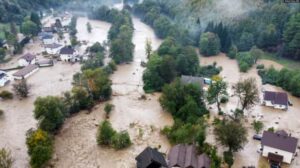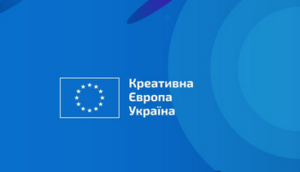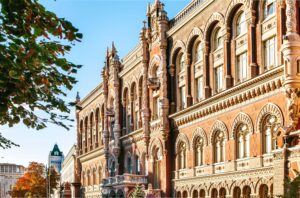
The death toll from the devastating floods in Bosnia and Herzegovina, which are being called the worst in decades, has already reached 19. On the morning of October 4, it was reported that heavy rains in Bosnia on Friday night had flooded several cities in the central and southern parts of the country.
After 16 people died in the municipality of Jablunice, rescuers also found the bodies of three people in the city of Fojnice, where the bad weather destroyed many houses and outbuildings.
Against this backdrop, Serbian President Aleksandar Vucic and Croatian Prime Minister Andrej Plenkovic agreed to provide all necessary assistance to Bosnia and Herzegovina.
Vucic previously noted that Serbia could send rescue helicopters and boats, as well as provide financial assistance.
And the Croatian prime minister said that his government is in constant contact with the head of the Council of Ministers of Bosnia and Herzegovina, Borjana Krishto, and is ready to provide “all the necessary assistance in eliminating the consequences of the flood.”
The EU High Representative for Foreign Affairs and Security Policy, Josep Borrell, also confirmed the readiness to help. He noted that Bosnia could benefit from the EU’s Civil Protection Mechanism, which it joined in 2022.

Fourteen EU countries, as well as Norway, Switzerland and Liechtenstein, have signed an appeal calling on the EU executive to propose new rules to strengthen return policies, Politico reports.
In their letter to the European Commission, 17 European countries ask for new rules that will allow governments to detain illegal migrants if they pose a threat to national security, force migrants to cooperate with authorities, and ensure that all EU countries use the same data management software.
The letter to the Commission states that migrants who do not have the right to stay in the EU “must be brought to justice.”
It is noted that Norway, Switzerland, and Liechtenstein have also signed the appeal, although they are not members of the EU, they are members of the Schengen area.
The publication notes that the push comes amid a right-wing and anti-immigration shift in many EU countries.

Ukraine continues to hold the third place among the main exporters of agri-food products to the EU after Brazil and the UK, the press service of the Ukrainian Agribusiness Club (UCAB) reported, citing an analytical report by the European Commission.
According to the report, Ukraine’s share in imports of agricultural products to the EU in the first six months of 2024 increased by only 2% (EUR 124 million) compared to the same period in 2023.
In total, imports of agri-food products to the EU reached EUR13 billion. Imports from Côte d’Ivoire increased the most in value terms – by EUR951 mln (+46%), followed by Nigeria with EUR473 mln (+132%), due to the rise in cocoa prices.
At the same time, imports from Tunisia more than doubled (+107%), mainly due to the growth of volumes and prices of imported olive oil. Imports from Australia decreased significantly by EUR843 mln (-46%) due to lower volumes of rapeseed, and from Brazil – by EUR634 mln (-7%).
The total exports of agri-food products from the EU in January-June 2024 reportedly reached EUR116.4 billion, which is 1% (+EUR1.1 billion) more than in the same period of 2023.
In the first half of 2024, EU exports to the United States grew the most, increasing by EUR1 billion (+8%) primarily due to higher prices for olives and olive oil. This sector also contributed to an increase in exports to Brazil by EUR209 million (+18%).
The EU’s exports to China decreased by 9% (-EUR689 million) in the period from January to June 2024 compared to 2023.
This is mainly due to a decline in several major products exported from the EU to China, including pork, dairy products, and cereals.

The European Union’s Creative Europe program will continue to support Ukraine’s culture and creative industries sector in 2025, the Ministry of Culture and Strategic Communications reports.
“Ukrainian audiovisual projects have the opportunity to take full part in the competitions of the Media subprogram, which aims to support the European film and audiovisual industries and to develop, distribute and promote European works, taking into account the modern digital environment,” the ministry said in a statement.
It is noted that six such competitions have been announced, namely: European co-development; video game and immersive content development; television and online content; talent and skills development; 360° media; innovative tools and business models.
According to the announcement, grant applications can be submitted from October 1, 2024.
“The total amount of funding for projects that will receive grants under the above competitions is EUR 81.5 million. The total budget of the EU’s Creative Europe program in accordance with the Annual Work Program 2025 is EUR 340 million,” the agency added.

European Commissioner for Energy Kadri Simson says the European Union is ready to completely stop the transit of Russian gas through the Ukrainian gas transportation system after the expiration of the current contract in December this year.
“When I spoke with my colleagues in Ukraine, I made it clear that we are preparing for a situation where the transit agreement between Ukraine and Russia will expire by the end of this December. We have found alternative supply routes, and the Member States or their companies that are still receiving gas from Russia have in fact been granted two additional years compared to other companies that Russia has decided to stop supplying to in 2022,” the European Commissioner said at a press conference in Brussels on Wednesday.
At the same time, Simson stated that Ukraine’s gas transportation infrastructure is also part of the EU’s infrastructure, as part of the European gas is stored in Ukraine’s storage facilities, “which provide us with additional capacity.”
“Ukraine is also a gas producer, so we have to make sure that their infrastructure still has value. But my message is very clear: there is no need to look for any new ways to continue trading with Gazprom. Alternative supplies are available, and we are engaging with affected member states to show them that alternative routes will deliver the volumes they need,” she elaborated.
Simson also referred to the words of Ukrainian President Volodymyr Zelenskyy, who said in late August that “Ukraine is not interested in extending the transit contract with Russia, and that European companies have the right to use Ukrainian infrastructure.”
According to the European Commissioner, her “main mission is to encourage companies that are still receiving Russian pipeline gas because they had contracts signed before the war to choose more predictable alternatives.”
Simson also cited figures showing that the share of Russian gas in EU imports fell from 45% in 2021 to 18% by June 2024, while imports from reliable partners such as Norway and the United States increased. In addition, the EU reduced gas demand by 138 billion cubic meters between August 2022 and May 2024.
“The EU reached its 90% winter gas storage target on August 19, 2024, well ahead of the November 1 deadline, and energy prices are more stable and remain well below the peak levels of the 2022 energy crisis,” she elaborated.

The National Bank of Ukraine (NBU) has authorized the purchase and transfer of foreign currency by resident legal entities that are e-commerce entities abroad to pay value added tax (VAT) on the purchase of goods from domestic producers by consumers from EU countries.
“The condition for these transactions is that the e-commerce entity must be registered as a taxpayer in the EU. This mitigation will primarily support small and medium-sized businesses that will be able to promote their own goods on the EU market through trading platforms,” the central bank said in a press release on Monday.
The regulator assumes that this will not have a negative impact on international reserves, as the inflow of foreign currency to Ukraine for the goods sold will far exceed the additional demand for currency to pay VAT in the EU.
In addition, the NBU announced a number of other currency easing measures. In particular, the central bank allowed state-owned companies to buy and transfer foreign currency abroad to cover carbon dioxide emissions.
“State-owned enterprises will be able to buy foreign currency and transfer it to non-residents to purchase quotas to cover or compensate for carbon dioxide (CO₂) emissions associated with aviation activities,” the National Bank explains.
According to the regulator, this step contributes to the continuity of defense procurement under state contracts, will allow for further air transportation abroad, and will support military-technical cooperation with the EU.
Other transactions that the NBU has authorized since September 10 include payments for operations under reinsurance agreements concluded with foreign nuclear insurance pools.
“In particular, to pay a break-even bonus, which is a mandatory condition stipulated by the reinsurance agreement. This mitigation will have a minor impact on international reserves and at the same time will allow the Nuclear Insurance Pool to fulfill its obligations to partners, which is important for the smooth operation of the industry,” the NBU said in a release.
As reported, the regulator also allowed Ukrainian businesses to reimburse coupon payments on Eurobonds paid from February 24, 2022, to July 9, 2024, at the expense of their own foreign currency accumulated in Ukraine.
At the same time, starting from September 10, the NBU introduced a limit of UAH 100 thousand per month for payments for watches, jewelry, precious stones and coins from currency cards of Ukrainian banks abroad and up to UAH 500 thousand per month for transactions with real estate agents.
All of the above innovations are introduced by Resolution No. 108 of September 6, 2024, which was officially promulgated on Monday, September 9.